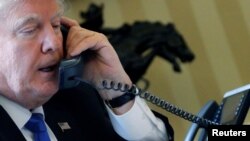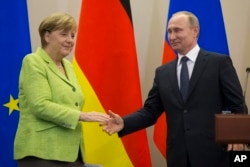U.S. President Donald Trump and Russian President Vladimir Putin spoke by telephone Tuesday, their first such conversation since Russia condemned a U.S. military attack against Syria last month in response to a nerve gas attack launched on civilians by Syrian forces.
The two leaders discussed the civil war in Syria, as well as the situation with North Korea, according to the White House, which described the conversation as "a very good one."
Kremlin officials, quoted by Russian media, termed the call "businesslike and constructive."
The two leaders agreed to have their top diplomats, Foreign Minister Sergei Lavrov and Secretary of State Rex Tillerson, step up discussions on a cease-fire for the six-year-long conflict in Syria, according to the Kremlin.
"President Trump and President Putin agreed that the suffering in Syria has gone on for far too long and that all parties must do all they can to end the violence," according to the readout off the call issued by the White House.
Cease-fire
Putin is pushing for a cease-fire in the Middle East country. Talks on that topic are to begin Wednesday in Astana, the capital of Kazakhstan.
The United States will send a representative to the Russian-organized meeting, which also will include Iran and Turkey.
A previous set of negotiations, jointly led by Russia and the United States during the Obama administration, failed to achieve a breakthrough.
During their call Tuesday, Trump and Putin also discussed "safe or de-escalation zones to achieve a lasting peace for humanitarian and other reasons" in Syria.
The call was the third between the two leaders since Trump won the presidential election in November. The two spoke last month after a terror attack in St. Petersburg, Russia, and a week after Trump's inauguration in January.
"The call seems to have been positive," professor Henry Hale of George Washington University's Elliott School of International Affairs told VOA. "I'm glad Trump and Putin appear to have agreed on how to disagree on Syria, first and foremost minimizing the chances of an unfortunate direct military conflict between the U.S. and Russia, which could have terrible consequences."
Hale, who is co-director of the Program on New Approaches to Research and Security (PONARS) in Eurasia, noted, "It is important simply to maintain channels of communication between Washington and Moscow. In that light, the announced American participation in the Astana talks will also be a positive."
Possible meeting
Officials at both the White House and Kremlin say discussions are under way for a possible meeting between Trump and Putin on the sidelines of the G-20 summit scheduled for early July in Hamburg, Germany.
During his campaign, Trump expressed hope he and Putin could work together to combat terrorism. Last month, though, Trump said U.S.-Russian relations "may be at an all-time low."
Meanwhile, FBI and congressional investigations continue into the Trump campaign's contacts with Russia and Russia's interference in last year's U.S. election.
Putin called such allegations rumors in remarks to reporters earlier Tuesday in Sochi, following a meeting with German Chancellor Angela Merkel.
"We never interfere in the political life and the political processes of other countries and we don't want anybody interfering in our political life and foreign policy processes," said Putin.
The Tuesday meeting with Merkel that Putin hosted in the Black Sea resort city was described as tense by observers.
The German leader said she raised concerns with Putin about human rights violations in Russia, including "how important the right to demonstrate is in a civil society."







